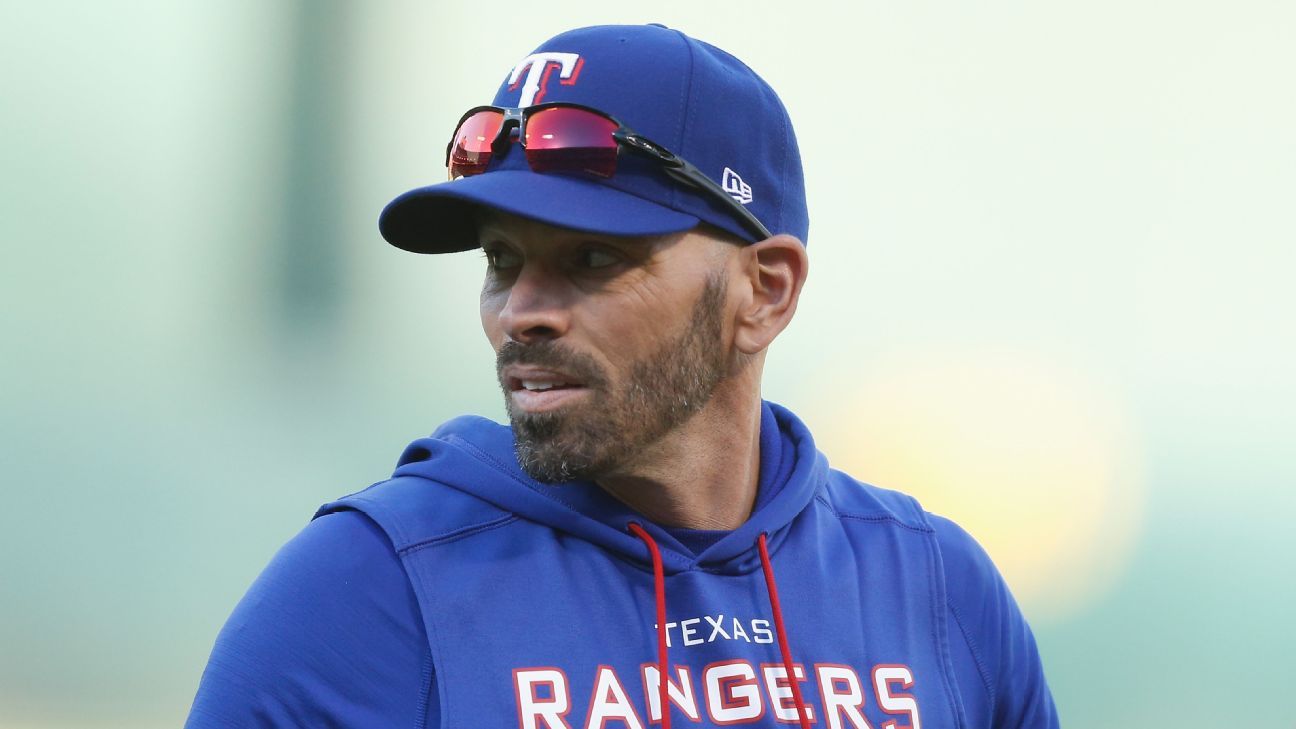
The Texas Rangers fired manager Chris Woodward on Monday amid a season of dissatisfactory progress despite the investment of more than a half-billion guaranteed dollars in the free agent market over the winter, the team announced.
The Rangers occupy third place in the American League West with a 51-63 record. Woodward, after his fourth consecutive year with a losing mark, will be replaced by third-base coach Tony Beasley, who has been named interim manager through the remainder of the 2022 season.
"Chris Young and I had the very difficult task of informing Chris Woodward of our decision today," said Rangers president of baseball operations Jon Daniels in a statement. "In his tenure as Rangers' manager, Chris worked tirelessly under what was at times some difficult circumstances. He has been dedicated and passionate in his efforts to improve the on-field performance of the Texas Rangers, and it is greatly appreciated. He has represented the organization with class and dignity.
"We have had extensive discussions over the last several weeks and while the team's current performance is certainly a big part of this decision, we are also looking at the future. As the Rangers continue to develop a winning culture and put the pieces together to compete for the postseason year in and year out, we felt a change in leadership was necessary at this time.
"On behalf of the entire Texas Rangers organization, we thank Chris and wish him and his family the very best."
The additions of Corey Seager -- with whom Woodward was close from his days as a Los Angeles Dodgers coach -- Marcus Semien and Jon Gray this past winter heightened expectations following a 60-102 season in 2021. While the Rangers have played far better this year, with a run differential near even, their 6-24 record in one-run games would be the second-worst single-season winning percentage in such finishes since 1900, according to ESPN Stats & Information research.
Texas in November gave Woodward a contract extension that covered the 2023 season and included a 2024 option. The Rangers hired Woodward in November 2018 after coaching stints with Seattle and the Dodgers that followed a 12-year career as a utilityman.
He arrived in Texas to replace Jeff Banister, who had won division titles in his first two seasons after replacing Ron Washington but struggled to a last-place finish in 2018. The Rangers hoped Woodward would stabilize the role as the organization transitioned through a rebuild, which produced a better-than-expected start in 2019 as Texas went 78-84. But last-place finishes in the shortened COVID-19 season and last year prompted the Rangers to accelerate their timetable in the open market.
While they have one of the deepest farm systems in baseball, adding Seager at $325 million and Semien at $175 million to form their half-billion-dollar middle infield was the move meant to thrust the Rangers into at least near contention. Seager's and Semien's slow starts have abated -- they've combined for nearly six wins above replacement -- but Texas' pitching ranks among the league's bottom third in ERA and fielding independent pitching.
The new manager inherits a Rangers team with plenty to dream on -- particularly if the team hits the free agent market this winter with money to spend and a starting pitcher to acquire. The Rangers considered multiple options at the trade deadline, including trading for starting pitching and even going after Juan Soto, but they held on to a farm system that features a wide array of talent at the top levels. With Seager and Semien, center fielder Adolis Garcia, catcher Jonah Heim, Gray -- and perhaps left-hander Martin Perez, with whom the Rangers have discussed an extension -- a core Texas can build around exists.
Finding a manager to bring the best out of the club in a division with a Houston Astros team that's perpetually competitive and a Seattle Mariners team on the rise is now the goal. Texas revamped its coaching staff over the winter, and now comes the most important hire yet in a manager the organization hopes can accomplish what Woodward didn't: a return to the glory days of 2010 through 2016, when the Rangers made the playoffs five times in seven years.















 Phone: (800) 737. 6040
Phone: (800) 737. 6040 Fax: (800) 825 5558
Fax: (800) 825 5558 Website:
Website:  Email:
Email: 






